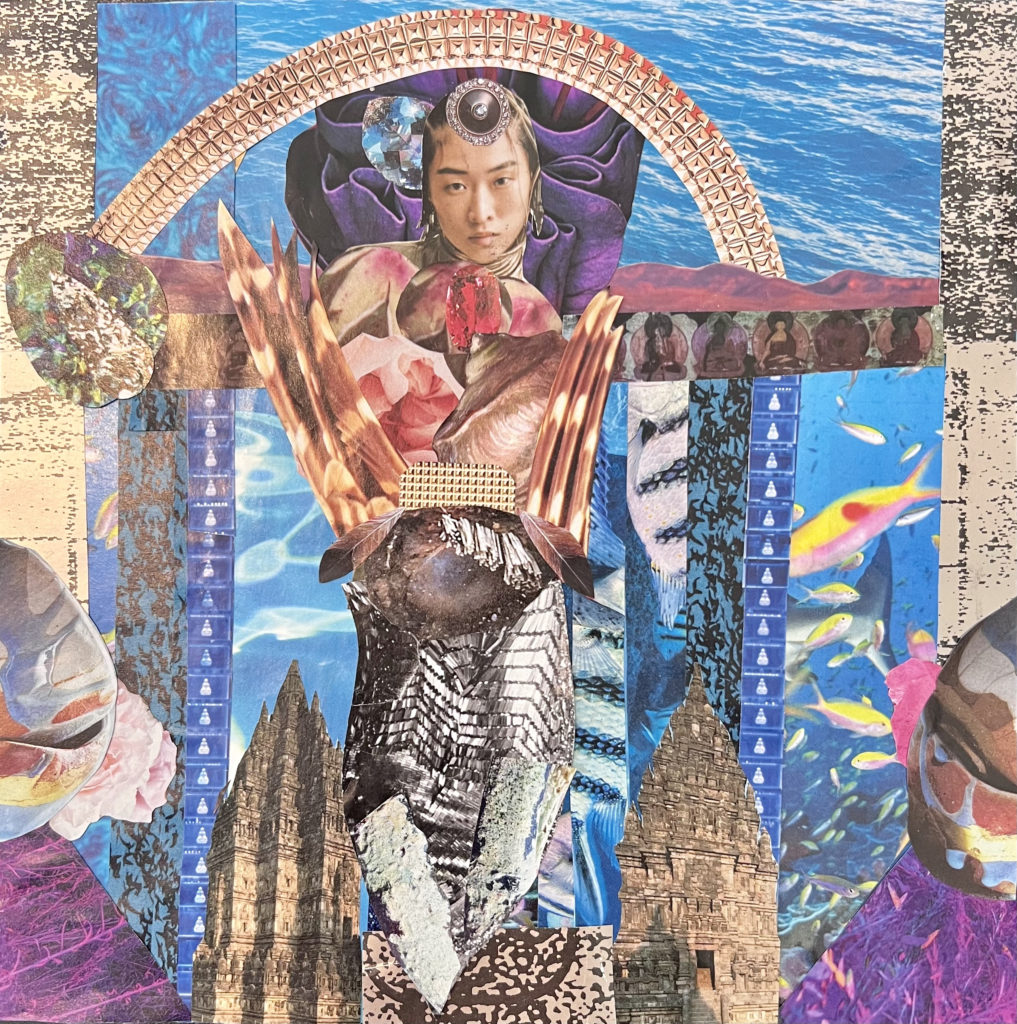When Mermaids Weep

One thought circled Phi’s mind like a ravenous hawk. She was the last mermaid on earth. She couldn’t recall the last time she spied glimmerwings. That’s what Bà called each shimmering scale that appeared on her tail when she came of age. Perhaps they were hiding under long gauzy layers of fabric that shushed as those foreigners trudged by.
In the earliest days of After, her glimmerwings would draw strangers’ gawks and wide maws. Now there were too few left to be finger pointed. Each time she lost another one she cried, even though, to her disbelief, she could walk with newfound strength. Her lungs swelled. She couldn’t stop herself from sob gasping, each breath harder to swallow than the last. Tears were the closest reminder of her birthplace and memories of her salty-eyed kin. Each one, a ballad stitched underneath her skin.
Phi clutched a necklace her great-grandmother, her namesake, gave her as a child. She inched an unforgiving chair towards a rusted patio table at an erstwhile diner called Jo’s. Its dented sign sat atop heap of shingles, the letter J a lopsided grin.
Another scorcher. Her tears dripped into an empty mug like a soft rain. Tip-tap, tip-tap. Her morning ritual. A whispered prayer of home.
*
Phi’s sisters were her world. In the cerulean depths of the ocean, they giggled and quibbled together. She was the youngest of five, the baby of the family. They chased eels and errant rowboats in the kelp forest, tickling each other with long tubular strands. They collected oyster shells, wrote love ballads and performed riotous musicals. Her favorite game was tail tag, where she had to swim backwards to avoid getting ousted. Time stretched with a lazy eye towards the sky.
One day near the summer solstice, the sun was hidden by clouds and her sisters swam out fast ahead of her. She lost sight of them. The waves grew dark and cold. A bitter pit swelled in her abdomen. Their absence, a void. Racing with alarm, she swam home—straight into Bà’s arms.
They didn’t wait for me, she cried. Her great grandmother, whose long black hair flowed past her arms, had a gift. She was a charmer; she could see the future. Bà gave her a necklace with a pendant in the shape of a winged tail, glinting rainbows in an arc of sunbeams.
Wah! Wipe away your tears, child, she said. Your name means flying, Phi. Look, she poked her. These wings mean you are destined to fly far from here. And one day you will be the one they follow.
Phi looked toward the churn of agitated clouds. She could see frantic fish and kelp forests and wild creatures somersaulting in a silver tsunami cloud. She blinked and looked at Bà. Were her great-grandmother’s eyes watering?
Something is coming, she said. I feel a thundering herd in my glimmerwings.
*
Mermaids had tried to warn humans. Phi’s sisters spelled out signs on seashells, sand dunes, even trash bins: Stop trampling our earth, polluting our air, ravaging our homeland, stop poisoning our seas, you foolish dumbbells. Stupid, stupid illiterate beasts. But no amount of prodding, insults or threats would stall mouth breathers and their goddam greed.
One day the earth mother opened her giant maw and swallowed the fancy cities and the mountain towns and the people who inhabited them. Gulp after gulp after gulp.
Until it was all gone.
Phi lost sight of her sisters near their hideout and woke up days later with her tail shriveled on an abandoned shore. Everything was unfamiliar. Metallic sand dotted with chipped bones. Her head erupted with grief.
Her ocean had vanished. Half the population wiped out. Only mud and metal survived. She could still hear echoes of her sisters’ screams. Terror ricocheted her chest. She saw limbs and flailing tails in the inky darkness of her nightmares.
*
Why was Phi the only one of her kind saved? This question haunted her, clanging in her eardrums. Her tail dissolved. She scoured abandoned cities and barely recognizable towns. Only overturned cars and ransacked barns. She wandered through tent villages at the edges of once great tree forests and traveled as far as the desert. No one spoke her tongue. No one was left to wipe away her tears. This abandoned diner had become as familiar as the kelp forest once was. Loneliness, her sole companion.
*
A hundred mornings later a woman in a cornflower blue dress waved her arms wildly at her. Phi froze, stunned by her sudden appearance.
I’ve been searching for you, she said. My name is Jo. This was my diner. Before, you know, everything. She paused to catch her breath.
Me? You can understand me? Phi squinted to take in her eyes. She saw a hint of blue, something familiar like the ocean. She was reminded of her sisters, once so full of life.
Yes, you’re most definitely her. My mother gave me a painting when I was a girl. The most beautiful creature I had ever seen. Every silverfish, every starling, every human circled you in prayer. I thought you were imagined until today.
This human, who reminded Phi of all that she had lost, stretched out a hand towards Phi. Her palm, a soft opening, an invitation.
A warm kindling awoke in Phi’s belly. A familiar scent of home saturated her lungs. The vanilla musk of star-shaped gardenia blossoms infused with brine and hope. She understood that their fates were intertwined.
Her Bà’s voice returned. You will be the one they follow.
*
A pair walked hand in hand north following a trail of milky white petals. Overhead a red-tailed hawk hailed her mate. Cak-cak, cak-cak. Phi wiped the last of her tears with her skirt. Her eyes glimmered a deep phosphorescent blue, the same shade as the flying, flying sea.

The daughter of Chinese immigrants, Jen Soong grew up in New Jersey, and now lives in Northern California. An alum of Tin House and VONA, her work has appeared in The Washington Post, The Audacity, Black Warrior Review, Witness, and Waxwing. She earned her MFA in creative writing from UC Davis. Her memoir-in-progress a reckoning of myth and migration. Find her work at jensoong.com. Photo by Haley James.

 BACK TO ISSUE
BACK TO ISSUE